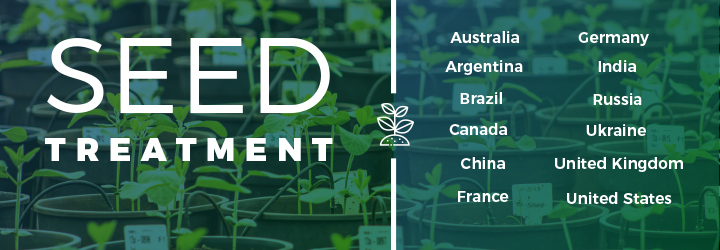Gradually implemented regulations are strongly impacting the overall plant protection products market in France. To ensure a better control of the pesticides used in the country, the French government implemented Certiphyto certification, a provision of the national Ecophyto plan. Since 2015, all professional users of pesticides must get the Certiphyto certification to use all types of chemical seed treatments.
Alternatives to Conventional Seed Treatment
A sustainable alternative to conventional treatment, biological seed treatments are still minimal in France in 2018, as they often require a specific way of use and can be priced higher. In addition, farmers can be reluctant to use biological products if they can use available efficient and well-established products.
Another alternative is genetically modified organisms (GMO). GMO crops are grown in several countries, including the United States, India, and Denmark, to increase both yields and disease resistance compared to conventional varieties. However, GMOs are banned from use in France, and the government is not expected to allow their use in the near future. As a result, current research efforts are focused on the development of hybrid non-GMO seed varieties.
Impact of Regulations
A large part of conventional insecticides is suspected to strongly affect beneficial insect varieties, especially bees. Consequently, insecticides account for most of the plant protection products banned, and many high added-value pesticide products have disappeared from the market in favor of lower added-value products. The insecticide restrictions concern the following active ingredients: thiamethoxam, fipronil, imidacloprid, and clothianidin. Since the ban only came into effect in December 2018, imidacloprid has been widely used during the 2017-2018 season by farmers, especially to treat wheat and sugar beet crops.
In recent years, the canola seed treatment market in France has been the most severely affected with the ban of two seed treatment products with a high market value—Cruiser OSR and Mesurol. For these reasons, in 2018, the French seed treatment market is estimated to be over 5% lower in value than the 2016 level.
Market Insights
In 2018, wheat remains the largest crop in terms of surface area treated. Compared to 2016, areas cultivated have remained practically stable. Farmers increasingly save a part of the seed generated by their harvest to sow at the beginning of the next season in order to save costs. In wheat, it is estimated that over 50% of the seeds planted in France come from saved seed.
Fungicide seed treatments account for the largest seed treatment covered area in 2018, with more than 9.8 million hectares treated in France, which represents almost 89% of the overall planted area. Although fungicide seed treatments account for the largest area treated, it is only about 40% of market share in terms of value, while insecticides and insecticides + fungicides capture together the remaining 60%. Indeed, insecticide seed treatment active ingredients are usually higher priced and used at higher concentrations than fungicide seed treatment active ingredients.
Seed Treatment Supplier Landscape Shifts
Semences de France, a branch of the In Vivo group, remains the largest seed supplier in 2018, followed by Limagrain and Pioneer Semences. Bayer has become the leading supplier of seed treatment products due to its merger with Monsanto in early 2018. Therefore, in 2018, Syngenta is the second leading supplier of seed treatments in France. Syngenta and Bayer together capture an 86.4% market share of the overall seed treatment market in France.
Is Biological Seed Treatment the Answer to a Challenged Market?
In 2018, biological seed treatment is still an emerging market in France, accounting for an estimated 0.6% of the overall seed treatment in value in the country. Currently, all biological seed treatments registered can be used for both conventional and organic farming. In 2018, wheat and potatoes are the only crops where biological seed treatments have been registered. While the biological seed treatment market is still emerging, Kline predicts a CAGR of nearly 22% from 2018 until 2028.
Seed Treatment: Global Market Analysis and Opportunities is a detailed analysis of and outlook for one of the most dynamic sectors in all of crop protection.
About Kline
Kline is a worldwide consulting and research firm dedicated to providing the kind of insight and knowledge that helps companies find a clear path to success. The firm has served the management consulting and market research needs of organizations in the agrochemicals, chemicals, materials, energy, life sciences, and consumer products industries for 60 years. For more information, visit www.KlineGroup.com.

